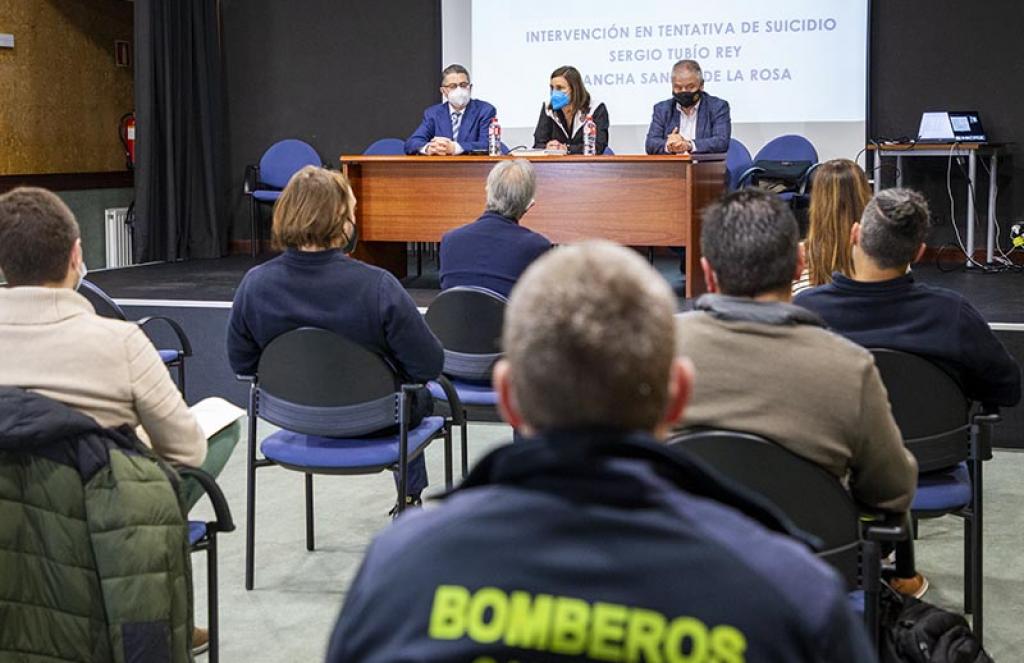Thessaloniki gets ready for its metro launch in November
The underground rapid transit lines have been under construction for almost two decades due to various project delays
 TheMayor.EU logo
TheMayor.EU logo 
The Cantabrian Minister of Presidency speaking at the start of the course, Source: Gobierno de Cantabria
The regional authorities consider it important to remove the taboo around that subject
On 19 May, the Cantabrian Government organized a specialized course aimed at people working in the regional emergency services, which taught them techniques on preventing suicide attempts. The course itself was led by Sergio Tubio from the Madrid City Fire Department, together with representatives from the 112 Cantabria emergency line.
These kinds of measures were considered necessary, and the regional government has made steps towards including them as part of its Emergency Training and Civil Protection Plan. Last year, the 112 Emergency Attention Center registered 273 warnings for suicide attempts in this Spanish autonomous region. As for the country, as a whole, it was reported that 10 people per day die of suicide, twice as many as due to traffic accidents.
The Cantabrian Government would like to tackle that issue, the way it would other social problems, with the difference being that in this case prevention is even more essential, in fact, this is where most of the efforts and resources need to be concentrated if suicide rates are to be curbed.
For this reason, the regional Minister of the Presidency, Interior and Justice, Paula Fernández Viaña, advocated at the start of the course, for addressing suicide, usually considered a taboo subject, with a "preventive" perspective, and with follow-up and support from psychiatrists and psychologists. In her opinion, it was paramount to involve experts in the field, together with emergency services in interventions related to suicide attempts.
"Nobody can ignore that these are interventions with a special sensitivity and that specific training is essential to provide the necessary tools to emergency personnel to be able to deal with such situations with greater security," said the Minister of the Presidency, also highlighting the particular impact of the pandemic on mental health and, consequently, on suicide deaths.
Course attendees, such as local firefighters and other people working in intervention services acquired extensive training for risk assessment and quick decision making in stressful situations. Likewise, notions of dealing with people with suicidal ideation, negotiation, mediation and persuasion were given. Additionally, there was training on the risk factors, the different phases that the victim goes through, and the possible signs of progress in the negotiation or final outcome.

The underground rapid transit lines have been under construction for almost two decades due to various project delays

Now you can get your wine in Talence by paying directly in Bitcoin

That’s because the state has to spend money on updating the railway infrastructure rather than subsidizing the cost of the popular pass

Rethinking renewable energy sources for the urban landscape

The examples, compiled by Beyond Fossil Fuels, can inform and inspire communities and entrepreneurs that still feel trepidation at the prospect of energy transition

Now you can get your wine in Talence by paying directly in Bitcoin

The 10th European Conference on Sustainable Cities and Towns (ESCT) sets the stage for stronger cooperation between the EU, national and local level to fast track Europe's transition to climate neutrality.

At least, that’s the promise made by the mayor of Paris, Anne Hidalgo

The underground rapid transit lines have been under construction for almost two decades due to various project delays

At least, that’s the promise made by the mayor of Paris, Anne Hidalgo

Hostal de Pinós is located in the geographical centre of the autonomous region

Despite its church-y name, the district has long been known as the hangout spot for the artsy crowds

Urban dwellers across the EU are having a say in making their surroundings friendlier to people and the environment.

Forests in the EU can help green the European construction industry and bolster a continent-wide push for architectural improvements.

Apply by 10 November and do your part for the transformation of European public spaces

An interview with the Mayor of a Polish city that seeks to reinvent itself

An interview with the newly elected ICLEI President and Mayor of Malmö

A conversation with the Mayor of Lisbon about the spirit and dimensions of innovation present in the Portuguese capital














